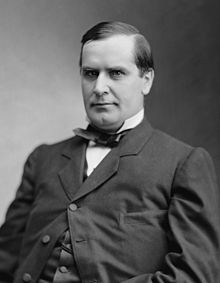
The Tariff Act of 1890, commonly called the McKinley Tariff, was an act of the United States Congress, framed by then Representative William McKinley, that became law on October 1, 1890.[1] The tariff raised the average duty on imports to almost 50%, an increase designed to protect domestic industries and workers from foreign competition, as promised in the Republican platform.[2] It represented protectionism, a policy supported by Republicans and denounced by Democrats. It was a major topic of fierce debate in the 1890 Congressional elections, which gave a Democratic landslide. Democrats replaced the McKinley Tariff with the Wilson–Gorman Tariff Act in 1894, which lowered tariff rates.[3]
- ^ Frank W. Taussig, "The McKinley Tariff Act." Economic Journal. 2 (1891): 326–350 online.
- ^ Reitano, Joanne (1994). The Tariff Question in the Gilded Age: The Great Debate of 1888. University Park, PA: The Pennsylvania State University. p. 129. ISBN 0-271-01035-5.
- ^ Taussig, F. W. (1892). The Tariff History of the United States (8th ed.). New York: G.P. Putnam's Sons. p. 291.
